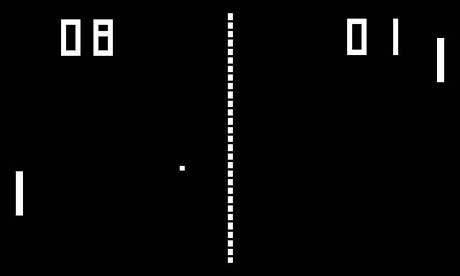The Weakness of Simulation Theory
Why do Elon Musk and others take this KEY question for granted?
“We are living in a Simulation.”
“In fact, the odds that we aren’t, are 1 billion-to-one.”
. . .What?
Elon Musk famously claimed that we are living in a computer simulation, where you and I are effectively no more than just video game characters being controlled by someone or something in the “real world”.
Other public figures, such as Scott Adams, have bought into this theory as well.
The argument goes like this:
Look the state of video games 40 years ago, like Pong.
2. Look at the state of video games today, with their photorealistic 3D visuals and massive multiplayer support.
And we have virtual reality, augmented reality, et al. — which keep getting more realistic.
If you assume any rate of improvement whatsoever, continuing into the future, the games will be indistinguishable from reality.
Even if you assume that rate drops, we’ll still eventually hit that critical point.
You can imagine these hyper-realistic games running on billions of computers.
So, if it’s the case that we’ll inevitably reach a point where the computer game is “identical” to reality. . .
what are the odds that we’re not already there. . .
that this “reality” hasn’t already been technologically achieved, and we ourselves aren’t actually super advanced video game characters being generated by computers?It seems infinitely more likely that simulated reality has already been achieved elsewhere, rather than us “humans” being the first to achieve it, here in our “world”.
I made a visual representation of the pro-simulation argument for you:
Are you convinced?
Case Closed?
Not in the slightest.
Here’s my question for the Simulation-ists. . .
What if the improvement curve is asymptotic?
Yes the rate of recent technological improvement is massive, but what if, with respect to the aspects of technology that are intended to “simulate” reality, the progress curve eventually flattens as it approaches some asymptote representing the fundamental substance of reality?
Notice how I also differentiate between a threshold of “indistinguishability” vs a “perfect replica”.
Because these are different things.
I agree that the computer simulations are on a trajectory that, if left uninterrupted, will produce simulated experiences that are indistinguishable to our five primary, exterior senses (sight, sound, touch, taste, smell).
But I’m not convinced that a simulation sensorily indistinguishable from reality would also completely fool our internal, intuitive senses.
It’s possible.
Though even if we would all be fooled, the claim I’m making here is that reality has a substance that is not reducible to the wavelengths perceived by our exterior senses.
Reality contains more than just the properties associated with sight, sound, touch, taste, and smell—even though these are the most salient features of reality.
There is an underlying substance to it, which can’t be recreated.
Now what is this “substance”? How do you even know if it exists?
Sounds unfalsifiable.
Well, in some sense it is.
But I would argue it’s axiomatically perceived in a way that can’t be adequately captured with words.
You just feel it, with your interior senses.
I could be wrong, but this goes back your exact experience of Consciousness. . .your experience of being a Subject.
Everything we try to do “out there” to replicate Consciousness, using Objects and empirical methods, approaches BUT NEVER CROSSES into the realm of the Subject.
It’s the same analogy here.
It’s why AI will never truly be conscious, despite having all of the external appearances and functions found with consciousness.
For the unique reader who is both an AI + Thomas Aquinas enthusiast, I think you’ll appreciate the following analogy I made:
For some, this may be the first time you’ve heard this terminology of “substance" and “accidents”.
But it’s what Catholics use to justify the doctrine of transubstantiation, whereby the physical bread and wine become, ontologically speaking (in their essence or substance), the body and blood of Jesus Christ, despite retaining all of the properties of bread and wine.
Anyway, before I digress too much. . . the main point is that at the center of reality there is a core mystery.
It’s the mystery of the integrative link between Mind and Body.
Between Subject and Object.
All of our technological advancements optimize the Object… the material space.
And our manipulation of the object (technological creation) has an impact on us, the Subjects.
The ones who think, attend to, reason, and will.
Despite the amazing progress of arranging pixels, wavelengths, and electricity, we have no reason to believe that we will EVER be able to cross into the other side of the Curtain of Consciousness.
And consciousness is inseparable from reality (insofar as we are the conscious subjects observing it. . .).
We will never be able to create a Perfect Replica of reality.
Hint: We are not God.
Thanks for reading!
Don’t become an NPC in someone else’s simulation,
Drago







